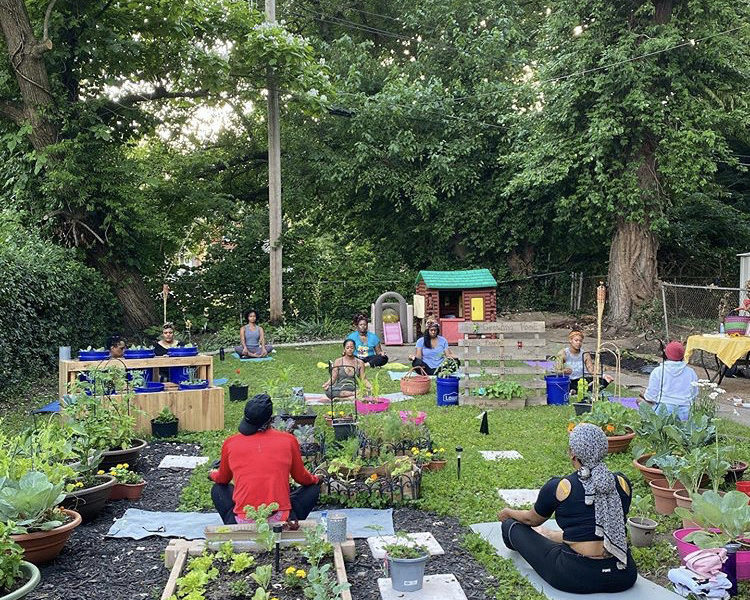As we work to create a food system that is safe for workers, nutritious for consumers, and profitable for environmentally responsible farmers, COVID-19 has shown that this system is flawed. As I worked through COVID-19 and saw the urgency of what was happening in this country and how we could possibly be facing a food shortage, I saw the impact it was having on small scale farmers who are predominantly white. I then saw the urgency to help those farmers survive, have a steady income, and avoid crop loss. From helping promote CSA’s, to thinking about delivery options, to pushing for policy that supported farmers economically. For those that do food system work it was an exciting time to come to the aid of farmers who are trying to make the planet a better place by using good stewardship practices.
However, as I sat through all of that, I couldn’t help but feel anger because the fight for Black farmers and the Black community wasn’t there. As COVID-19 stats climbed within the Black community, familiar responses were offered — food banks, food drives, and sub-par standards. As I started speaking with local Urban Black farmers, they were struggling to prepare for the season. Uncertain about what COVID-19 was or how it would impact them and their loved ones, most got a late start. But if not COVID-19, there would have been something else that would hinder that process, because frankly this food system has never been equitable to Black farmers.
The only solution that has been given to the Black community when in need such as this, is a crippling temporary effort that would never be enough to sustain the whole of us if we suffered a complete food shortage. I am not saying that there isn’t a place for food banks, food giveaways or food pantries, but when these temporary fixes outnumber grocery stores in North St. Louis City, there is a problem that needed to be addressed before COVID-19. The problem is two-fold. It isn’t just about what is missing in our community, it’s also about the goodness that is coming from our community that isn’t acknowledged or supported.
In the two years that I have worked as a food justice organizer, I’ve seen people in our region go from not ever acknowledging that Black Urban farmers exist, to now trying to source from them because a grant wants to know how racially equitable they are. The problem is that Black farmers — both urban and rural — have had to deal with trying to find a profitable market to make a profit in, a changing consumer that wants organic but doesn’t know what that means, and most of all, a USDA that has overcharged massive interest on loans based on race, causing Black rural farmers to lose their land.
Urban farmers have been locked out of grants, had intellectual property stolen when collaborating with others, and have not been given the same opportunities to thrive as others in our area. The result is a lot of failed community garden projects. However, the most dedicated of us stay and pay out of pocket to do not only what we love but what we know our community needs.
The owner of We Grew That Farms, Tia Byrd, doesn’t own the land she farms on. She has tried to buy the land several times but no one would sell it to her. After investing so much more money in this land that she doesn’t own, one might ask why wouldn’t she just leave and find other land to own. It’s more than land ownership, it’s about community — a community that has always seen businesses leave at the slightest sign of trouble. For Tia, the consistency of community members seeing her show up every season is enough for her to keep returning and try to find other ways to obtain ownership of the land and expand her operation.
Or, take Kamina, who is a second generation farmer in East St. Louis working on land that she does actually own, and doesn’t have enough for a tiller to put plants in the ground unless someone does it for her. Kamina has shown up for East St. Louis as a farmer working with institutions that were more than willing to utilize her skills and talents for free, but in spite of funding for Urban Ag, hasn’t seen any financial compensation or resources to help her further establish the important work she was doing for a community that didn’t have a grocery store. Mr. and Mrs. Carrington left corporate America to start a farming operation in the city of St. Louis and their interactions with the USDA is one that we have heard far too often from Black farmers. They applied for a farm number and when they arrived to speak with the local FSA office, they were told they weren’t in the system — but being persistent helped. Once their names were spelled correctly by the FSA officer, their number was found.
Through all the obstacles that these farmers face they still continue to work with and for the Black community.
This summer, with the support of Women’s Earth Alliance, FSM and the Nature Conservancy, I was able to start the first grant for Black, Indigeous, and People of Color (BIPOC) in North St. Louis City and County and parts of the Metro East that are considered a Food Apartheid. These mini-grants were used to support urban farmers who needed help during the growing season. Recently, MCE received additional funds from several individuals, enabling another round of grants.
We can never fully see change in the food system unless we allow both Black and other farmers of color, and Black communities and other communities of color to be in control of their food system.

